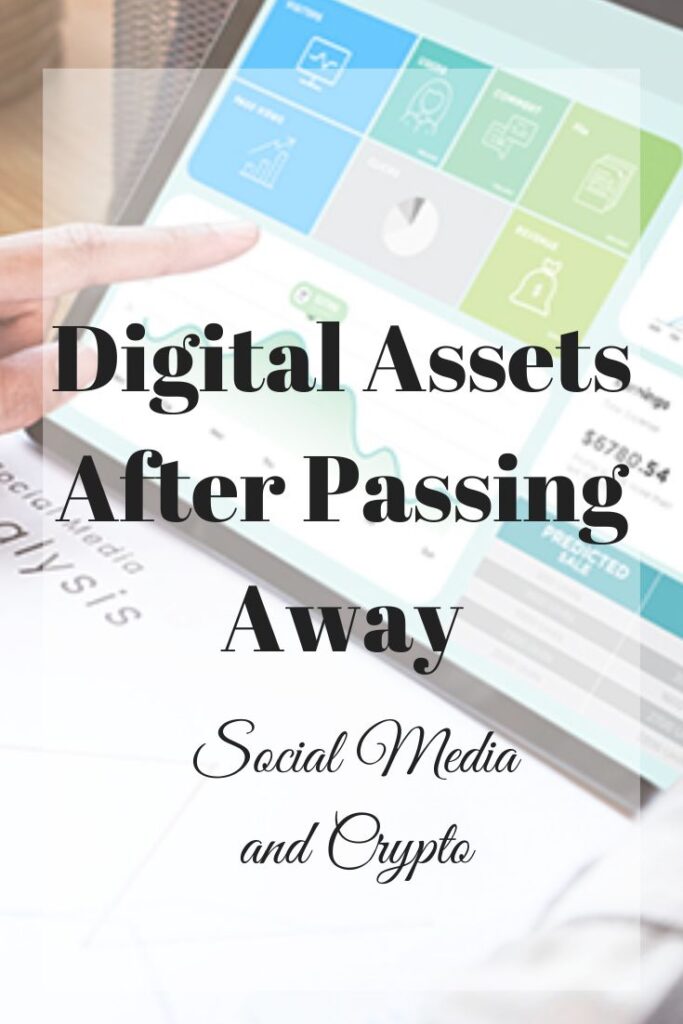DIGITAL ASSETS AFTER PASSING AWAY – SOCIAL MEDIA AND CRYPTO
Have you ever considered what happens to your digital assets if you suddenly pass away? Your family is grieving, sorting through your belongings—and they can’t access your crypto wallet. Your social media accounts continue to exist. Frozen in time. Posts, memories, messages… all untouched. Digital assets are not just tech jargon. They’re real. They’re valuable. And they’re often overlooked when planning what happens after death.
Let’s talk about how to manage your digital afterlife—with precision, empathy, and foresight.
Not Just Photos and Passwords: What Are Digital Assets?
Digital assets are anything stored digitally that holds personal, emotional, or monetary value. And no, it’s not just the Bitcoin you bought in 2017 and forgot about. Think bigger.
- Your Twitter DMs.
- That old Gmail inbox with important contracts.
- Your Twitch stream revenue.
- NFTs.
- Your domain names.
- Google Photos.
- Your Etsy shop.
- That AI-generated art you mint once a week.
The issue? These assets aren’t always included in a will. And even if they are… good luck accessing them without the right keys, passwords, or two-factor authentication tokens.
The Harsh Reality: The Law Isn’t Catching Up Fast Enough
Estate law is slow. Tech is fast. In between that speed gap? Confusion.
Many countries still don’t have airtight legislation around who can inherit or access digital assets. Your heirs may need court orders to get into your iCloud. Even then, Apple can say no. Facebook will memorialize your profile, but they won’t hand over control of it unless you’ve set it up beforehand. And if your crypto wallet was non-custodial (meaning you held the keys, not an exchange), it might be lost forever. No one can crack it open without your seed phrase. That’s the brutal beauty—and risk—of decentralization.
Social Media After Death: A Personal Museum or Digital Ghost?
What should happen to a digital identity after someone dies? That’s a deeply personal question. Some people want their profiles deleted entirely. Others want them to live on, a kind of digital gravestone. The truth is, most people never make that decision, so loved ones are left to figure it out. Each platform handles this differently:
- Facebook allows you to appoint a “Legacy Contact.”
- Instagram offers memorialization or account deletion with proof of death.
- Google has an Inactive Account Manager—most people have never heard of it.
- Twitter/X? Good luck. Their process is infamously murky.
There’s no consistent rulebook. Which means you need to write your own.
Crypto Is a Beast of Its Own
Let’s get specific. Cryptocurrency is inherently challenging to inherit. There’s no 1-800 number for your Ethereum wallet. No password reset option.
Say you’ve got Bitcoin stored in a hardware wallet. Unless someone has:
- The physical device
- The PIN
- The recovery seed
… it’s gone. Forever.
Even if your family knows about your crypto, that’s not enough. They need access. And access means knowledge. Which means preparation.
Some crypto investors keep their recovery phrases written on paper, in safe deposit boxes. Others split the phrase into parts and store them in different places. This can work. Or it can backfire spectacularly.

A New Kind of Will: Think Beyond Paper
Your traditional will is probably not enough. It’s vague on digital things. Vague doesn’t cut it. Instead, consider writing a Digital Estate Plan. This doesn’t need to be legalese. It just needs to be clear.
Here’s what it can include:
- Inventory: List of all your digital assets—accounts, wallets, domains, etc.
- Access Instructions: Passwords, 2FA tokens, location of recovery phrases.
- Wishes: What should happen to each asset? Delete it? Transfer it? Archive it?
- Contact List: Who should be notified? Who gets control?
Store this document securely. A password manager with an emergency access feature can help. Or a sealed envelope with a trusted person. Or a secure vault service that triggers access after a period of inactivity. And yes, talk to a legal probate lawyer to iron out what your local laws allow when it comes to digital inheritance.
Don’t Assume the Tech Companies Will Help You
Spoiler: they won’t. Companies are focused on the living, not the dead. Unless you’ve set up legacy access (which most people don’t), they’ll bury you under policies, fine print, and canned email replies. Your loved ones will have to prove your death. Then prove their connection. Then maybe—maybe—get limited access. It’s not personal. It’s just policy. So shift responsibility. Make access possible before it becomes necessary.
Real Talk: What Happens If You Do Nothing?
Let’s not sugarcoat this. If you don’t plan:
- Your crypto could vanish.
- Your creative work could be locked away forever.
- Your loved ones could lose valuable time and money navigating vague legal terrain.
- Your social media could become a chaotic graveyard of birthday wishes from people who don’t know you’re gone.
It sounds dramatic. But it is the hard truth that may sting some of your loved ones left behind.
A Ritual of Digital Closure
We prepare funerals. We pick out caskets. We draft eulogies. But rarely do we prepare for our digital disappearance. Yet in today’s world, the digital self is the self. Preparing your digital estate isn’t morbid. It’s compassionate. It’s structured empathy. It allows your people—your real people—to grieve cleanly. Without guesswork. Without Googling how to delete a Snapchat account for someone who died. It gives them peace. It also gives you control over the legacy you leave. Not just physically. But virtually.
Start With One Step
This isn’t about writing a 30-page plan tonight. Start with one action.
- Open your password manager.
- Add a note about your main accounts.
- Enable legacy settings on your Google and Facebook accounts.
- Back up your crypto seed phrase somewhere safe and tell someone you trust where it is.
Do one thing. Then another. Make it routine. Because eventually, someone will go looking. They’ll open your laptop. They’ll check your phone. They’ll click through your tabs, trying to understand the world you left behind. Help them out. Leave a roadmap, not a maze.
Death doesn’t have to mean digital erasure. With a bit of forethought, your digital life can be wrapped up with the same dignity you’d want for everything else you leave behind. Or — if you choose — parts of it can continue, echoing your voice long after you’re gone. That’s not just preparation. That’s authorship. Of your ending. And of what comes after.
YOU MAY ALSO LIKE:
Why the Financial Implications of Divorce are Never Easy


